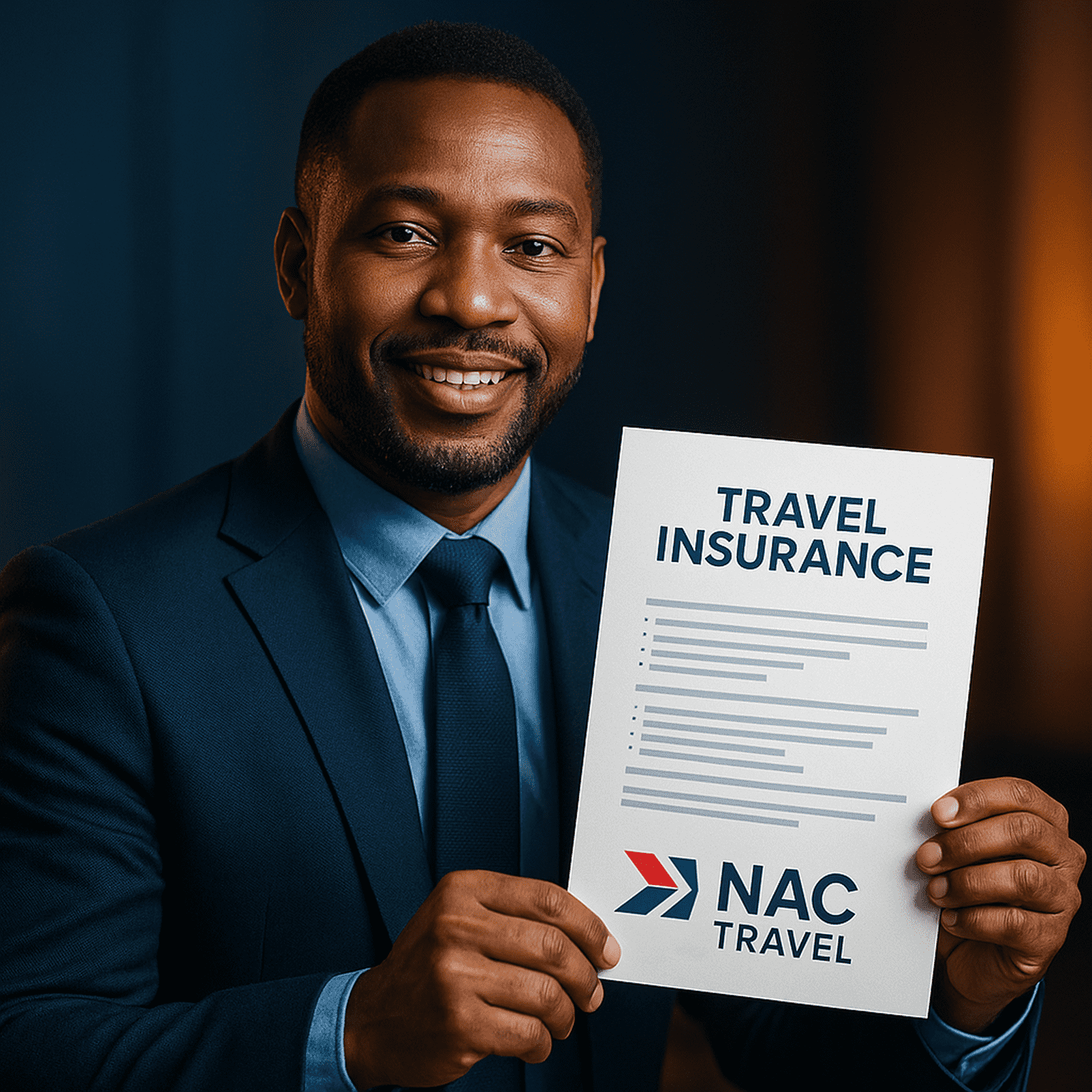What embassies want, what you actually need, and how NAC Travel International helps
Buying travel insurance can feel like a guessing game. Embassies ask for one thing, airlines another, and real life has its own list. Here is a clear guide to the difference between visa-compliant insurance and trip-ready protection, plus how NAC Travel International matches a policy to both the embassy rule and your personal risk profile.
What usually counts for visa purposes
Requirements vary by country, but consulates commonly look for:
-
Emergency medical cover at a stated minimum limit
-
Emergency medical evacuation to the nearest suitable facility
-
Repatriation of remains to your home country
-
Validity for the full trip dates and for all countries on your itinerary
-
Certificate of insurance that shows your name, dates of cover, territory, limits, and a 24-hour claims number
-
No cashless promise is required, but many missions prefer policies with direct billing where available
Tip: the insurance certificate must match your passport name and travel dates exactly. If your dates shift, ask the insurer for an updated certificate before your appointment.
What is actually useful in the real world
A policy that only clears a visa check can leave big gaps. Look for:
-
Higher medical limits than the minimum, especially in countries with expensive hospitals
-
Primary medical coverage so claims do not depend on another insurer first
-
Reasonable deductibles you can afford to pay on the day
-
Pre-existing condition language that you can meet, or a waiver if available
-
Adventure sports or winter sports add-ons if you plan to do them
-
Emergency evacuation to the nearest suitable facility, not just to your home
-
Trip interruption and delay for real costs like extra nights and rebooking
-
Baggage and valuables with per-item limits that reflect what you carry
-
Personal liability for accidental damage or injury you cause
Read the exclusions. Common ones include unmanaged pre-existing conditions, riding powerful motorcycles without proper licensing, certain altitude limits, alcohol-related injuries, and professional sports.
Quick comparison: visa minimum vs trip-ready cover
| Area | Visa check often accepts | What protects you better |
|---|---|---|
| Medical limit | A stated minimum | A higher cap that matches destination costs |
| Dates | Exact travel dates | Dates plus a buffer for delays or rebooking |
| Territory | Countries on your route | Worldwide or multi-region if plans shift |
| Evacuation | Included on paper | Evacuation with clear triggers and no low sub-limits |
| Excess | Any deductible | A deductible you can pay without stress |
| Extras | Not required | Interruption, delay, baggage, liability, sport add-ons |
Students, workers, and long stays
-
Student visas may ask for specific benefits, campus-approved providers, or minimum mental-health cover.
-
Work visas sometimes require employer medical schemes after arrival. You still need travel medical cover for the journey and first days.
-
Multi-entry plans should include annual policies or multi-trip riders if you will cross borders often.
Paperwork that avoids embassy delays
-
Insurance certificate with your full name as in passport
-
Dates and territory that match the itinerary and cover the entire stay
-
Coverage limits listed in the units the consulate recognizes
-
24-hour emergency contact and claims instructions
-
Letter of guarantee or visa letter format if the consulate requests one
Bring a printout to your appointment and keep a copy on your phone.
How NAC Travel International helps
1) Policy matched to rules and reality
We map the exact embassy requirement for your visa and your actual trip risks, then recommend a policy that passes the appointment and still protects you if something goes wrong.
2) Certificate in the format missions expect
You receive a clean certificate that matches passport names, dates, and territory. If your dates change, we arrange a revised letter before you submit.
3) Cost and coverage balance
We compare limits, deductibles, and exclusions so you do not overpay for benefits you do not need or under-insure expensive risks.
4) Add-ons made simple
We include sport riders, gadget cover, rental-car damage, or annual multi-trip options when your itinerary calls for them.
5) Claims-ready guidance
You get a one-page emergency sheet: who to call first, which documents to keep, and how to file quickly. We can help you assemble receipts and reports if you need to claim.
Fast checklist before you buy
-
Does the policy meet the embassy minimums and list them on the certificate
-
Are the names, dates, and territory correct
-
Is the medical limit high enough for your destination
-
Do you understand deductibles and exclusions
-
Do you need sport or multi-trip add-ons
-
Do you have the 24-hour contact saved
Bottom line
Visa compliance is the starting line, not the finish line. Choose insurance that satisfies the consulate and shields you from real-world costs. NAC Travel International handles both sides: the exact certificate the embassy wants and a policy that fits your route, activities, and budget.
